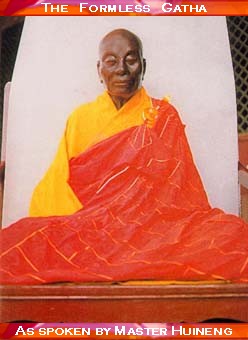
In Cantonese the name of Huineng(1) is Weilang. He lived between 638 and 713. His "Platform Sūtra" is the only ch'an/zen text that is given the epithet "sūtra", an epithet that otherwise is reserved for sayings by (a) Buddha. All other ch'an/zen texts by other masters are called commentaries, sayings, or aphorisms.
The general opinion is that Huineng/Weilang stayed in his master's temple as a layman. This is not correct. As soon as someone enters the monastic life s/he receives either the precepts of a postulant or that of a novice. In this function s/he is allowed to perform some layman's tasks such as dealing with the temple's finances etc.
Huineng/Weilang had the status of novice which means that he was a mere underling compared to the fully ordained monks around him; they had, as it is called in Pāli and Hybr.Sanskr.: "upa-sampadá".
It was generally the case that the most senior monk (m/f) would upon the demise of the abbott/abbess take his/her position unless incapacitated, whether this position is oficially handed over or not.
When during a nightly meeting Huineng's dying abbott handed over his almsbowl and his "24 strokes abbott's/senior's upper robe" to his preferred pupil, as a sign of handing over the position of abbott, both were in violation of the ancient procedure and knew it. This receiving the bowl and robe, more than a difference of opinion about the inner meaning of ch'an/zen, became the bone of contention between Huineng and his seniors — senior in both position and number of monks' years. He fled.
The romantic tale goes that during his flight Huineng spent considerable time with hunters and robbers. He did. But eventually he was taken in by a wealthy Confucian family where an unmarried aunt taught the illiterate Huineng how to read and write.(2)
By the time Huineng landed himself in Canton and in the position of abbott and ch'an master he could read all the sūtras and write comments on them. He was no longer illiterate.
As Huineng had a monk's position not higher than that of a novice, he could not bestow higher ordination upon any of his fellow novices in his Cantonese temple — you cannot pass on what you don't have. Therefore, after his demise his lineage came to an end. That is to say, as he occupied the abbott's seat, let's say, illegally, being a mere novice, he could not confer the title of bhikshu, fully ordained monk to any of his fellow-novices. And therefore he could not pass on the abbott's seat, as it was illegally occupied — illegal in the sense of the monk's rules, not in the secular legal sense of the word.
This tradition of transmitting abbott's positions has been greatly misunderstood by Japanese professional Buddhists in the zen lineages. As they are half laymen, half professional, they do'nt have a right understanding of the three grades of monkhood (postulant, novice, full monkhood, after "12 years standing" followed by "seniority"), and how a novice could not bestow full monkhood on someone else.
Instead the Japanese in a way reformulated the professional transmission of material and dharmic leadership, and turned it into a transmission of Dharma alone. In the case of immodest zen teachers an "enlightened" roshi transmits the "wordless Dharma" onto someone of his choosing who in that very instance takes the title of roshi too, and is considered equally enlightened.
In the case of modest zen-teachers, a senior, or superior, or founder gives "inka", the right to teach, to someone of his liking.
The dying out of Huineng's lineage had nothing to do with dying out of a ch'an interpretation but everything with the end of a lineage of abbotts in the above sense of material and spiritual leadership over temple communities. This is why the East-Asian Buddhist temple communities (except Japan) hold on to the old tradition: they see an unbroken transmission of abbott/abbess-ship as a guarantor of continuity.
(1) see for the correct pronouciation the fourth example [Chinese (Hong Kong) Pronunciation].
(2) That women in ancient China, those of well-to-do families, were proficient in reading, writing and therefore as much specialists in "the Classics" as men is proven by a third Century biography of a lady living during the Jin Dynasty [Righteous Rethoric, (thesis) Dominik Declerq, Leiden 1993]. A certain "Kundi gao" "had this portrait of his mother: Our mother the Lady Yang ..., I first received her instruction in the study of calligraphy, ..., and when I devoted myself to the Odes and the Documents, Ritual and Music, she was ever diligent and untiring."
July 2019 / April 2020
|